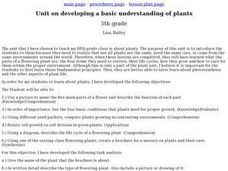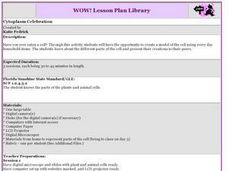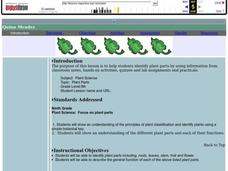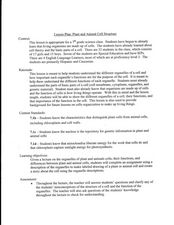Nuffield Foundation
Investigating Transport Systems in a Flowering Plant
Some weddings have flowers in a unique, unnatural color to match the theme. Young scientists take part in this process to learn about the function of the xylem as they observe colored water moving through a flower. Then, they experiment...
Curated OER
Regents High School Examination: Living Environment 2005
The 2005 version of the Regents High School Examination in the area of ecology is as comprehensive as previous years' exams. It consists of 40 multiple choice questions on everything from the structure of DNA to the interactions within...
Curated OER
Regents High School Examination: Living Environment 2010
This exam touches upon every topic within the typical first year biology course.. A broad variety of question styles give high schoolers every opportunity to show what they know. Why start from scratch when a comprehensive final exam is...
Curated OER
Unit on Developing a Basic Understanding of Plants
Fifth graders study the parts of a plant, their life cycles, and how to care for them in this unit.
Curated OER
Cell Reviews
Students draw cells, make a cell, and list organelles in plant and animal cells. In this cells lesson plan, students create edible cells.
Curated OER
Reproduction of Animals and Plants Crossword Puzzle
In this crossword puzzle, students answer 27 clues about vocabulary terms related to the reproduction of both animals and plants.
Curated OER
Reproduction of Animals and Plants Crossword Puzzle Answers
In this crossword puzzle worksheet, students are given the answers to 18 clues about vocabulary related to the reproduction of animals and plants.
Curated OER
TRANSPIRATION IN PLANTS
Young scholars define the hydrologic cycle, define transpiration, name the three parts of the hydrologic cycle, and record the amount of moisture given off by several green plants.
Curated OER
Plants
Student identify the characteristics of plants. Through hands-on demonstration, they create a model of plant parts. High schoolers differentiate between the major divisions of the plant kingdom with a particular emphasis on the...
Curated OER
Cell Theory, Plant And Animal Cell Comparison
Tenth graders study plant and animal cells. In this investigative lesson students draw their own animal cells and label them.
Curated OER
Microviewer
In this microviewer worksheet, students observe several types of cells. Students draw each type of cell and label the important parts. Students also answer questions relatable to the cell and the purpose for study.
Curated OER
Cytoplasm Celebration
Students create a model of a cell using everyday household items. They view digital microscope images of cells and cell parts, watch an online video, create a cell model out of household images, and record their presentation using a...
Curated OER
Plant Cells and Tissues
In this plants instructional activity, students review 17 vocabulary words associated with the different types of plant cells and tissues. This instructional activity has 17 matching questions.
Curated OER
Plant Parts
Ninth graders identify plant parts by using different classification methods. In this plant lesson students observe and draw different types of leaves then classify them according to species.
Curated OER
Plant Life Cycle
Fourth graders explore the plant life cycle. They discuss the sequence of events in the life cycle of the plant and illustrate how the life cycle never ends. Students explore the importance of water, sunlight, and nutrients during the...
Curated OER
Flowering Plants
In this flowering plants worksheet, students compare the structure and function of a tree trunk and a leaf. This worksheet has 1 true or false and 5 fill in the blank questions.
Howard Hughes Medical Institute
Viral Lysis and Budding
How do some viruses spread so quickly, and why do they make us feel terrible? Answer these (and many more) questions through a simple yet impactful lessons. Pupils observe demonstrations that show the two methods viruses use to escape...
The Science Spot
Flower Basics
Learn about plants and pollination with a instructional activity about the parts of a flower. After labeling the anatomy of a flower using a word bank, kids explain the difference between self-pollination and cross-pollination, and...
Curated OER
Pollination Power
Second graders study and examine the structure of a flower. In this pollination lesson, 2nd graders observe pollinators in the garden and dissect a flower. Students then plant strawberry plants in the garden and observe the process of...
Curated OER
Raven Chapter 10 Guided Notes: Photosynthesis
Kim B. Foglia has designed a comprehensive series of AP biology worksheets. This one focuses learners on the progression of photosynthesis in plants. In this assignment, they identify structures and steps on high-quality diagrams, use...
Curated OER
Algae Part One: An Introduction
Students have the opportunity to view two types of algae under 400x magnification with a compound microscope. They make observations and record their observations through drawings and words. In addition, they identify different qualities...
Curated OER
How Do Flowering Plants Reproduce
Young scholars investigate how flowering plants reproduce. They identify and describe the functions of the major sexual organs of a flower and fruit by examining and dissecting flowers and fruit.
Curated OER
Plant and Animal Cell Structure
Seventh graders identify the different parts and functions of the cell. In this biology lesson, 7th graders make a labelled diagram of either a plant or animal cell. They write a story about it.
Curated OER
Plant Cell Coloring
Students study a plant cell and its parts. In this cell organelle lesson students are to label parts of a plant cell and color them.

























